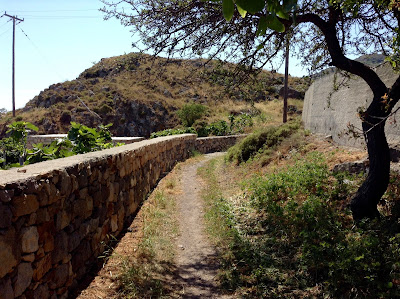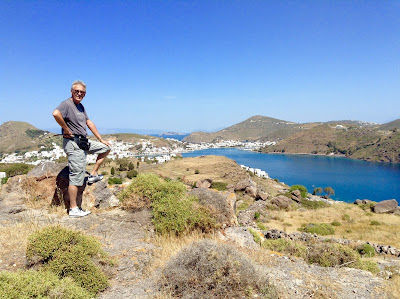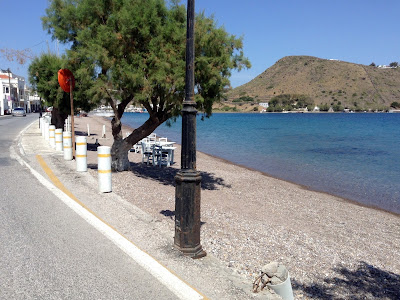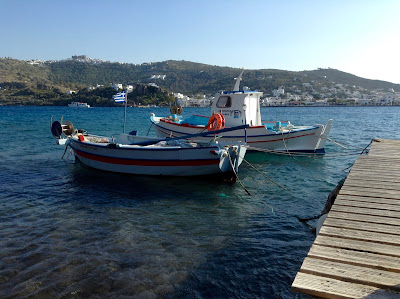Robert Plant is one of my musical heroes. In case you've been living on another planet for the past forty years, Robert Plant was the voice of Led Zeppelin and has produced some amazingly diverse music in his long solo career since then.
A couple of evenings ago, I'd have sworn he was also holidaying on Patmos. We were dining in the excellent Taverna Ostria, where I'd ordered the special of the night, which was oven-baked mackerel. Let me say right at the outset, that for €8 a portion, it was fan-blooming-tastic. Antonis, the waiter, brought me a plate with three very acceptably-sized fish on it, with a tasty rice garnish, and it would easily have fed two.
So, there we were, sitting on the terrace, looking out at the beautiful view along the bay northwards toward Netia (where we're staying), when a scooter pulled up at the periptero across the way and this guy who looked remarkably like Mr. Plant got off to buy some cigarettes. I remember saying to my beloved, "Now that's what I'd call a mountain-man", owing (apart from his clothes!) to his shock of shoulder-length, dishevelled wavy hair, which was more grey that its original colour owing to the fact that its owner was easily my age, if not older, I'd say. Pretty soon thereafter he climbed the stone steps to the Ostria's terrace and asked if we minded him sitting just behind us, in the corner, where he was soon joined by the other Antonis from the restaurant, the one who was working primarily behind the indoor bar and in the kitchen. A spirited conversation that we very much enjoyed ensued as it was getting toward the end of the evening and the customers remaining (all French. remind me to talk about that) were fast thinning out, giving Antonis time to sit, smoke and talk.
"Robert Plant" turned out actually to be Sotiris, and a very gentle-mannered and erudite man he was too. He also knew Rhodes, since he lives there during the winter months. In fact, he even knew where we lived, since he's a butcher by trade and knows the local one near us, Yiannis, who used to keep his pigs up the lane that leads to our house.
We told these two genial men, as we were leaving the restaurant, that the next day we'd be making the trip up to Hora (the picturesque village surrounding the huge, imposing monastery) on foot. I'd checked out the maps and it seems there is a footpath from the waterfront at Skala leading all the way up, and it was considerably more direct than following the road, which zigzags wildly as it climbs, thus making the trip a great deal longer. Of course, we'd seen that there was apparently a footpath cutting off the zigzags of the road too, but the one that appeared not to go near any of the roads seemed a nicer prospect. If you check the scan of the map below, you can see the path we were planning to follow, it's marked in orange around a dotted black line, and it sets out from just south of the main quay at Skala.
The path begins rather inauspiciously between a couple of old buildings across the road from the waterfront, just a few metres from the Tsipouradiko restaurant. You have to look hard to find the sign, which is a rather weatherbeaten old piece of wood that could do with a good sanding and re-varnishing if it's to do its job properly. As my wife said, in a rather jaded manner a little later on, that sign ought to have given us an indication of what we'd let ourselves in for.
Almost immediately, as one begins to follow the path, it starts to rise steeply. For the first couple of hundred metres or so you're ascending through a fairly typical Greek village environment, where the 'street' is narrow enough to give shade at any time of the day, where you pass old olive oil cans sitting on doorsteps and brimming over with geraniums and hibiscus. Cats sleep lazily beside the pathway and there's the occasional gap between two buildings where, incredibly, you see a car parked up under a canopy. On more that one occasion, on seeing one of these vehicles shoehorned into such a small space, I found myself thinking, 'How the dickens do they get that car in there? How do they even get it along this street in the first place? How do they get it in or out of that cubbyhole? I reckon the owners must winch their vehicles in by helicopter and then re-close the roof above it. They must use an awful lot of Vaseline, smearing it along the doors on both sides to get that car in and out."
Pretty soon, though, you leave the buildings behind and you're faced with this...
OK, it doesn't look so bad. Despite the better half expressing a doubt or two, I felt it looked fairly well tended and easily negotiable, so we continued on undeterred. Not long afterwards, this was what we saw before us...
Then this...
and so it went on...
 |
| At least the views were nice |
 |
| You feel like you're about to fall off the world at this point. |
 |
| "I no want to work here any more!!! [get it? Sorry about the silly voiceover]" The beloved protests and says too, " I may not like churches too much, but I'm mighty grateful they built this one here," as she made for a sit down in the shade. |
 |
| Aah, yes, nothing like a pleasant stroll in the countryside. That is the path, it's in there somewhere. |
After a very long hour or so, you see this before you..
That is the final thirty metres or so of the path. Where it meets the wall is where you step out on to a surfaced road at last. Turning to look back at the view, you get this...
 |
That is the final thirty metres or so of the path. Where it meets the wall is where you step out on to a surfaced road at last. Turning to look back at the view, you get this...
No sooner had I shot that, than a motor scooter could be heard trundling along the road to meet us. Turning to look in the direction of the sound, we were surprised to see that the rider was none other than "Robert Plant" himself, Sotiri, from the previous evening at the Ostria.
"You won't believe what we've just done!" We told him.
"Yes, I would." He replied, "I saw you from my window, I can see down the mountain from my kitchen window and I spotted you a few hundred metres before you got to the top. Not many people attempt that these days."
Why were we not surprised to hear that? I told him that top priority now was to get to a bar for a long cold drink. At this point he became just a tad vague. I asked which was the quickest route to a watering hole and he just gestured with his hand and said, "Kat efthees," which basically means 'straight on'. With that he smiled and bade us cheerio and set off along the road and down the snaky hillside towards Skala.
We began to ascend into the village, eager to find a bustling plateia with lots of tables and chairs and thus for me a very cold beer and for her a frappé. Things, however were not going to proceed according to plan.
Turning a few steep corners and ascending all the while, remarking on how quiet it was everywhere, we saw these three men (above photo) having a natter. "Aha!" We thought, they'll be able to point us in the right direction.
As they say in Yorkshire, "Did they 'eck as like?!"
We bade them kalimera and enquired about where one might find a café at which to resuscitate oneself after a mighty hot, sweaty and exhausting climb. One waved and went his way, one smiled and said little and the third said:
"Sit down, sit down! Where are you from? Tell me where you are from."
We sat on the wall beside him and told him of our origins. Looking at me he said, "Hah! Wise man, choosing a Greek for a wife. The best choice you ever made."
"Yes. Thanks. But, umm, where can we get a drink?"
"See that?" he said, pointing to the building just below us (the one on the left in the above photo), "That's my store. I'm not open yet though. If I were I'd fix you a drink." Now I don't know about you, but after what was now an hour and a quarter walking in difficult terrain on a very hot cloudless day, we were fast running out of conversation. So, realising that this man wasn't going to be of much practical help, we did our best to bid him a good day with grace and headed off further into the village itself.
Now, as you can see from the photos below, there's no disputing the beauty of Hora, which seemed to us to be a perfect meld of Lindos on Rhodes with the Old Town area on Naxos, but you may also notice a distinct lack of humans. In fact, it was almost like having been transported to the set of a Greek version of that old cult TV series "The Prisoner", only quieter.
To be honest, in view of how quiet it was everywhere, we both began to feel quite claustrophobic. It is very easy to get hopelessly lost up there. We found our way to the entrance to the monastery, but on seeing a very clear sign outside forbidding drinks and snacks being taken inside, we turned away and continued our reccy. There do not appear to be any signs anywhere showing maps of the place and telling you where you are. This can be very disorienting, because it's huge, and the warren of little tiny streets and alleys completely surrounds the rather huge edifice that is the monastery.
Having gone up a few blind alleys and retraced our steps, we were almost ecstatic when a young chap came trotting around a corner carrying two ice coffees in one of those cardboard holders. Hoorah!! Eh?
No.
"HI!" We both said, our parched throats bitterly complaining by this time, "Where did you get those, please?"
His reply? "Skala."
Well, thanks a bunch for nothing. We did have with us a small bottle of water to whet our whistles during the climb, but it wasn't anything like enough, since we were sure we'd find a quaint little square somewhere in Hora where we could have a drink and look at the view. The only people, other than this young chap (and a couple of women who also didn't seem to want to help much either) that we saw was a party of Chinese tourists that disembarked a minibus at the bottom of the village and were led by their guide up to the monastery. Of course they were safe in the knowledge that they only had to pile back into the minubus, after they'd clicked away taking photos inside the monastery, and they'd be back down in Skala in five minutes flat. Oh, wait, no. They couldn't snap away because that was something else that the sign outside the monastery entrance appeared to forbid, the taking of photographs inside.
Returning to the young chap with the iced coffees. When we bumped into him we'd just walked through a tiny 'square', hardly bigger than your living room, where there had been a few old metal and freshly-painted blue tables and chairs outside of a café that was closed. He'd said, "Go back there. it's my family who run that bar. Rap on the door. They'll fix you a drink."
Before we could even turn on our heels, he'd disappeared, as if he'd been a fanciful figment of our delirious imaginations. We did as he said, returned and tapped on the old brown wooden door of the establishment in question.
Guess what. No one came.
The long and the short of all this is: Hora to us was a massive disappointment. I suppose mainly because it's very early in the season. And yet it's a big village, easily as large as Lindos on Rhodes, yet it's like a ghost town in April. You may find us strange, and - as I so often say - 'each to his own' but we're not into monasteries and religious relics of questionable provenance. Without going too deeply into this kind of stuff, the so-called Cave of the Apocalypse is as likely to be the place where the apostle John received that series of visions as my back garden is to host the US Open Tennis Championships. Even the local guidebooks concede that, whilst of course it's established that John was an exile on this island when he received the Apocalypse, there is a gap up until the eleventh century before anything else much is known about Patmos. So for anyone to assert that they know where he was held is absurd in the least. Still, that kind of detail never was an obstacle to those seeking to make religious shrines out of all kinds of questionable locations.
It's only a personal thing anyway, but anywhere that masquerades as a shrine leaves me with a cold aversion. I went to Lourdes, in France, once. Couldn't get out of there fast enough to be honest.
No, what we like to see is the architecture, the terrain (saw plenty of that on this expedition!), the living history in old village streets and the characters that still live in them, and this was what was missing when we went up to Hora.
There was nothing for it but to head back down to Skala by the quickest route. So we set off down the road this time...
 |
| Down THERE! There are cafés and bars and restaurants!! Quick, run!!! |
Boy was I relieved when we flopped down into a couple of canvas chairs at the Petrino café/bar and I ordered a large Fix Hellas. The better half chose a frappé. They never tasted so good.
Dimitri, the waiter, told us, when we gave him a quick account of why we were so glowing with perspiration and desperate to drink something, "You should go up there in August. It's like Faliraki!"
Although we like Sotiri, 'Robert Plant', we were just a little miffed that he hadn't warned us what we were going to find when we asked him where we'd find a bar up there. Mind you, everyone (although few anyway) we'd met up there had evaded giving us a straight answer about were we could find a drink. I've actually abridged the tale a little. There was a woman too who'd kind of avoided the issue.
Curiosity satisfied. Next week we'll be walking to Kampos, to the North. I think we'll take two bottles of water with us though.





































































